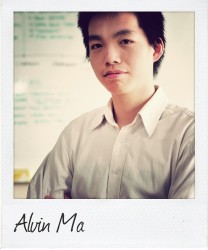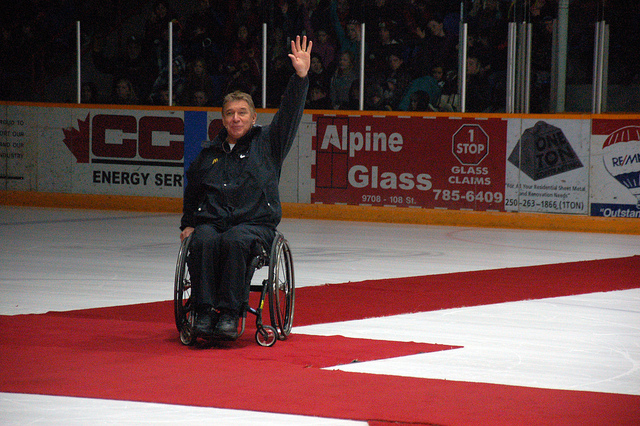"Sport is only a supplement to education"
March 20th, 2013 Sport for Development and Peace can only achieve optimal results when the strategy involves education and dialogue, says Alvin Ma, 21, a Correspondent from Toronto, Canada. Youth need to engage in sports and to discover their own ability to influence society.
Sport for Development and Peace can only achieve optimal results when the strategy involves education and dialogue, says Alvin Ma, 21, a Correspondent from Toronto, Canada. Youth need to engage in sports and to discover their own ability to influence society.
Canadian Paralympian Rick Hansen, an outspoken activist who set up a research foundation for those suffering with spinal cord injuries; astronaut Marc Garneau, the first Canadian to enter outer space; Chief Dan George, a prominent Aboriginal chief; and Roger Neilson, a popular former head coach of the Vancouver Canucks hockey team all feature in a video from a hydroelectricity company.
It concludes with a young boy flicking off a light switch by a young boy, and the message stating “When one believes they can make a difference, others will follow.”
The above names are likely unknown to non-Canadian readers on this site. Nevertheless, the figures from the hydroelectricity company’s commercial relate to the topic of “how Sport for Development and Peace can contribute to ‘putting young people at the centre of sustainable development.’“
But first, a little bit about me. As you can probably guess, I’m Canadian. I was born in and lived in Vancouver until last year, when I graduated with a Bachelor’s degree in Political Science. I spent the summer teaching English in Poland. Currently I’m a student and research assistant for the Centre for Sport Policy Studies at the University of Toronto, while continuing to teach English at an ESL language school and serving as a private tutor for various other subjects. I don’t know if I could classify myself as an ideal role model to “inspire a generation,” but if I were to apply the video’s theme of single-person inspiration, I know that I have the ability to make a difference by not only imparting, but mutually exchanging wisdom.
Naturally, as an aspiring higher-education instructor I believe that open-minded education goes a long way toward reaching the maximum potential of students. Especially at the stage where youths transition into enfranchised taxpaying adult citizens, interaction with thought-provoking and productive members of society is crucial to rounding out their social development.
As many Commonwealth correspondents have already stated, sports can serve as a platform to attaining this vision. Nevertheless, it is important not to over-glorify sports as a perfect stand-alone solution. In his book Fair and Foul: Beyond the Myths and Paradoxes of Sport, sociology of sport scholar Stanley Eitzen explores contradictions such as “Sport Unites, Sport Divides”, where he balances Olympic goodwill diplomacy with the excesses of competition, and united patriotism in victory with the excesses of nationalism in terms of racial superiority.
Rather than holding inherently high expectations from sports, we need to realize that sport is only a supplement to education. Sport for Development and Peace can only achieve optimal results when we have a strategy that involves education and dialogue. Article IX of the Commonwealth Charter highlights the promotion of “education, learning and the sharing of culture” in finding socially equitable and environmentally-friendly solutions that will fulfill the Millennium Development Goal of ending extreme poverty. While I am not a defeatist and I believe this target is achievable, solutions must be efficient, practical, and created in democratic consultation with an engaged crowd that is willing to listen.
Similarly, Sport for Development and Peace should do the same in terms of community engagement, rather than simply barging in to a country in need of aid with blatant disregard for cultural norms and traditions. This does not imply that discriminatory laws or attitudes in a given country should remain. Instead, there should be strategic planning in blending peace, education and sports. Youth can then aspire not only to become engaged with the sport activity, but also fascinated with the prospect of discovering equitable and solutions to global problems, not unlike the Canadian cultural heroes in the video.
However, as much as we can educate youths to shape the environment of their future, implementing these plans will likely be difficult. As much as we want to encourage youths to become more actively engaged through the lure of sports in association with their education, we cannot disregard other members of society. We cannot disregard the fact that youths do not have a uniform viewpoint, either. It should not be seen as a hindrance to development progress, but rather a reinforcement of democracy.
If youth are actively engaged in solving existing problems, they will have the evidence and facts to deliver strongly-supported arguments that can persuade other members of society, or develop reasonable compromises that benefit society and spur sustainable growth.
While it would be heart-warming to see all youth united in sports that promote positive peace and the Commonwealth Charter value of a “a compelling force for good”, both this year’s Commonwealth Theme of “Opportunity Through Enterprise” and line from the video are reminders that: “It starts with one.”
Photo credit: energeticcity via photopin cc
…………………………………………………………………………………………………………………
About me:
I’m currently a student and research assistant for the Centre for Sport Policy Studies at the University of Toronto. I also teach English at an ESL language school and serve as a private tutor for various other subjects. Passionate about teaching, sports, and politics, I hope to blend these interests and one day teach university-level courses on the politics of sports.
…………………………………………………………………………………………………………………
Opinions expressed in this article are those of the author and do not necessarily represent the views of the Commonwealth Youth Programme. Articles are published in a spirit of dialogue, respect and understanding. If you disagree, why not submit a response?
To learn more about becoming a Commonwealth Correspondent please visit: http://www.yourcommonwealth.org/submit-articles/commonwealthcorrespondents/
…………………………………………………………………………………………………………………




